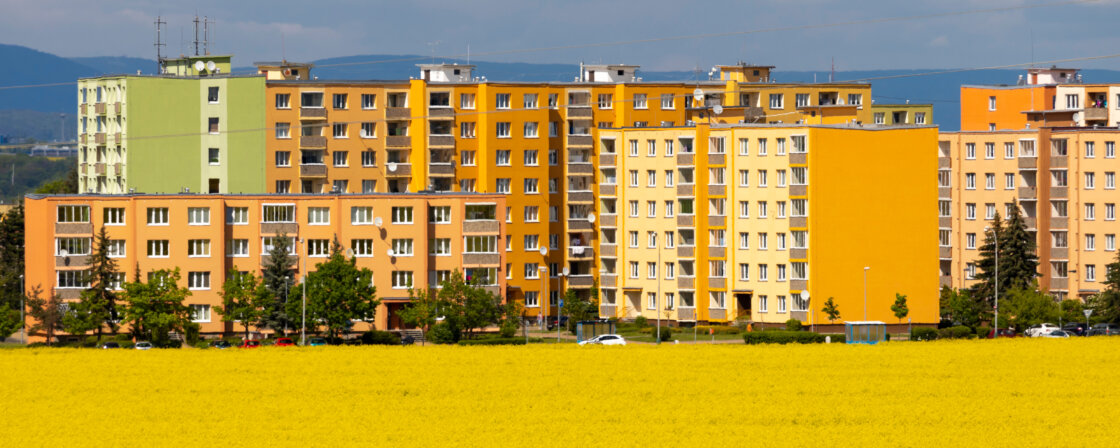Financing the purchase of a property
When you buy a property, you have several financing options. Nowadays, there is usually a combination of two or more options. Apart from paying cash and using a building society, there is also (rather hypothetically) a consumer loan. A product that is directly aimed at financing the purchase (even the construction or renovation) of a property is a mortgage.
Tip for article
Mortgage or rent? Which financing method to choose? The answer can be found in the next article.
Choosing a new mortgage
Most mortgage seekers will first look at the interest rates when browsing through the various bank offers. However, they can make a cardinal mistake in doing so, as they can easily overlook other important terms and fees. So what is the right mortgage choice?
Before you start surfing the banks’ websites, take a step back and get some basic information straight. First, be clear about exactly what you need the mortgage for (purchase, construction, renovation) and what the current prices are in the area. Following this, also calculate how much money you need and how much you have available. Do not forget to take into account not only the cost of the property itself, but also the cost of any moving, furnishing, renovation, etc. You may subsequently decide that a mortgage is not the most appropriate financial instrument and that you will, for example, be better off using your building society.
Are you solving a similar problem?
Are you looking to buy a property and mortgage?
We will assess the risks of the situation and advise you on the best solution. In addition, we can provide a complete contractual and legal service related to the sale or purchase of the property within 48 hours. Professionally, flawlessly and online.
I want legal service
- When you order, you know what you will get and how much it will cost.
- We handle everything online or in person at one of our 6 offices.
- We handle 8 out of 10 requests within 2 working days.
- We have specialists for every field of law.
How much do you need to have saved?
Previously, you had to have at least 10% of the value of the built-up property saved. However, the CNB has decided to reduce the LTV (Loan to Value) to 80% and you will now need one fifth of the final amount. To buy an apartment worth CZK 8 million, you will need to have at least CZK 1,600,000 saved.
The LTV for young people up to 36 years old is still 90%. However, the important thing is that it must always be their own home.
What other conditions do I have to meet?
There is an obligation that the applicant may spend no more than 45% of his/her net monthly income on the mortgage repayment. People under 36 years of age again have a slight concession. For them, it is sufficient if the repayment does not exceed 50% of their net salary.
The applicant’s total debt (including any loan repayments they are making) must not exceed 8.5 times their annual net income. Again, the only exception to this rule is for applicants under the age of 36 who want a mortgage for their own home. Their total debt may be up to 9.5 times their annual income.
Tip for article
When to choose real estate liability? Is it safe? And how does a pledge actually work and what kind of property can be pledged? Find out in our article.
What is the legal solution to a mortgage?
The legal characteristic of a mortgage is that the loan is secured by a mortgage on the property. The object of the mortgage may be:
- The property being purchased.
- Other real estate owned by the borrower.
- Real estate owned by a third party (e.g. owned by relatives or friends).
- Real estate that is registered in the Land Registry.
Which mortgage should I choose?
As we have already mentioned, it is not the happiest to be guided only by the interest rate when choosing a mortgage. However, that doesn’t mean you shouldn’t pay attention to it at all. While it won’t tell you the total amount you’ll pay to the bank, it’s a reliable guide. It’s highly likely that if the interest rate is better somewhere by, say, one or even two per cent, then the overall offer will also be better. However, this proportion may no longer apply where rates differ by tenths of a percent.
Be cautious and watch out for hidden fees
You can reliably use various comparison engines to compare offers. If you want to choose everything yourself, don’t choose comparison sites that ask for your personal data. Always remember to ask your bank where you have an account for a quote. Nowadays, it is no longer a requirement to apply for a mortgage with the bank you have an account with, but this may again give you an advantage in some way.
So by comparing offers by interest rate you have, for example, ten offers that look interesting. Another thing to look at is the fees, penalties and other terms of the mortgage.
For example, a low interest rate may be conditional on setting up an account, which usually comes with additional fees. Every hundred crowns that may seem insignificant to you in one month will turn into 42,000 crowns in 35 years. And that’s not a little.
Factoring in all the fees will help you work out the final cost of the loan. After that, a mortgage that offers two-tenths more interest but comes out much cheaper thanks to zero fees may turn out to be a better deal. But no one wants you counting every dime and multiplying by months and years of repayment. The APR, the annual percentage rate of charge, can serve you just as well. This value tells us how much you’re overpaying your mortgage overall. The APR should therefore be a key indicator to monitor and pay attention to.
Tip for article
Are you planning to buy an apartment as an investment for subsequent renting? We will draw up or review a lease agreement tailored to your case. Thanks to our services, even after the end of the lease, no disputes will arise between you and the tenant regarding unclear rights or obligations.
What else should we be interested in?
Most providers have a minimum interest rate subject to repayment insurance. But think about whether you’re already protected in another way – for example, with life insurance. Again, such a policy may end up costing you more than a higher-interest policy, but without insurance. In addition, even a policy may not cover all risks and is only valid for the duration of the fixation period.
When choosing a policy, don’t just consider your current situation, but think about what financial changes you may face in the future. While none of us are clairvoyant, you may know, for example, that you will be paying off another significant loan that is currently burdening you, or that you will be selling another property within a few years. Such a discovery should then lead you to possible early repayment or fixing lengths in the terms of the mortgage and, of course, this will affect the setting of the repayment amount.
What is a mortgage fix?
An essential element that we discuss with the bank when arranging a mortgage is the fixing of the interest rate. Banks usually offer a fixation for two to ten (or even 15) years. What does this mean for you? This period determines how long you will enjoy the agreed interest rate and pay the agreed repayments. And which option is most worthwhile for you? It’s impossible to say, as it depends mainly on the market If rates are at a low and expected to rise, then longer fixing periods are more expensive. If, on the other hand, they are at a high and are expected to fall, then fixed interest for longer periods is cheaper. Currently, most banks offer the lowest interest rate over a five-year horizon, and extremely short or long periods carry a higher interest rate.
What kind of property can be used as collateral for a mortgage?
It is typical for a mortgage loan to be guaranteed by real estate. As we have indicated above, you most often guarantee the loan with the property you are buying with the loan. However, this does not have to be the rule, you can also guarantee other real estate. Some banks, however, are reluctant to accept holiday properties such as a cottage or chalet as collateral. It is also difficult to guarantee a building plot, but it is not impossible.
Guaranteeing a cooperative apartment is not possible. Therefore, if you want to get a mortgage to buy a condominium, you will always need another property as well. In fact, you are only buying a condominium share. The flat remains the property of the cooperative.
More than one person can apply for a mortgage without necessarily owning the property. Some may therefore act as a de facto guarantor whose income is assessed when the mortgage is approved together with the person purchasing the property.
During the term of the loan, the persons named in the loan agreement may be changed, thus allowing the guarantor to bail out of the mortgage, for example, at a time when the reason for their joining the loan, such as an increase in income or a reduction in the debt of the ‘main’ applicant, has passed.
If you do not have any real estate to guarantee, you can take advantage of an offer that banks refer to as a mortgage without real estate guarantee. In reality, however, this is not a mortgage but a so-called pre-mortgage loan.
Summary
Buying a home with a mortgage is a common way of financing, often supplemented by your own savings or building savings. When choosing a mortgage, it is important not just to focus on the interest rate, but also to consider fees, APR, insurance and fixing terms. A mortgage can usually be obtained for 80% of the value of the property, with young people up to the age of 36 getting up to 90% if they own their own home.
Repayments must not exceed 45% (50% for younger applicants) of net income and the total debt must not exceed 8.5 (9.5) years’ income. The mortgage is secured by collateral – usually the property being purchased, but may be another property. A co-operative flat cannot be used as a guarantee. Without a property, a pre-mortgage loan can be used.
The length of the fixation affects the amount of interest – short fixations are advantageous at high rates, long ones at low rates. Be sure to keep an eye on the APR and consider future financial changes that may affect the choice of payment amount and repayment period. You can also arrange a mortgage with more than one person and adjust the terms later as your situation evolves.




